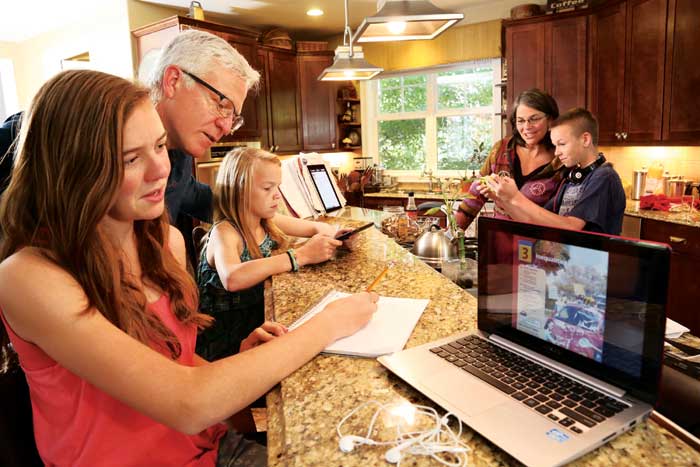
Chris Adams helps his oldest daughter, Grace, with her homework on her laptop as his youngest daughter, Ellery, reads on her tablet. Across the kitchen, Cheryl Fleetwood takes a break from cooking a recipe from her iPad to look at something Wiley wants to share on his iPhone. Like other modern families, they juggle spending quality time together now that both kids and adults use personal digital devices.
On a Saturday morning, 13-year-old Wiley Adams sits in his living room, headphones on, his attention focused on his iPhone. His mom, Cheryl, calls him from the kitchen—he doesn’t hear. His dad, Chris, tries—Wiley doesn’t hear him either. Cheryl, half-jokingly, asks Chris to text him. Within seconds of the text, Wiley shows up in the kitchen.
While there are vast benefits to technology, it creates new challenges for families. As people become more connected to their devices, they can become less connected with the people around them. How, in this digital age, do family members stay connected to one another and not just their devices?
Modern families are experimenting with ways to achieve that. Many try to balance time with and without electronics. That’s not always easy, though. Cheryl Fleetwood says it’s a huge commitment as a parent to monitor and communicate about using electronics.
“It’s not inherently bad or inherently fine. But it requires thought, and it requires monitoring,” said Dr. Solomon, child psychologist at Children’s Hospital Colorado. Mother of a 3- and 5-year-old, she agrees it is hard as a parent.
Fleetwood and her husband, Chris Adams, don’t have strict rules for their 10-, 13- and 14-year-olds. They do, however, enforce that electronics are a privilege, not a right. After they finish their homework, they are allowed to use electronics for other things like games or movies.
Just as Fleetwood and Adams model other values that are important to their family, like
good hygiene or a balanced diet, the couple
models healthy electronic use for their kids. Fleetwood tries to only use electronics in a way that enhances and improves her life; she doesn’t obsess over figuring out everything a device
can do.
As a member of what she calls the “sandwich generation,” Fleetwood is caught between different eras of technology. Whereas her parents grew up with no technology, her kids are digital natives, the generation surrounded with technology since infancy. Fleetwood, like most parents of young children, are immigrants to the technology era. “I understand it to some degree, yet we’re parenting kids who this is all they know.”
Her 14-year-old daughter, Grace, is required to have a tablet in ninth grade at George Washington. Wiley, 13, goes to McAuliffe where technology is fully integrated into the entire school. Classes use Edmodo, a site similar to Facebook that connects students and teachers who post homework assignments, Power Points and other resources. “We took away his iPhone as punishment, but he needed to check his Edmodo,” Fleetwood says.
Fleetwood and Adams say they sometimes check their kids’ texts if they believe they have been using electronics for talking to friends rather than doing homework. They do not allow them on Facebook or Ask.fm, a social media site where kids anonymously answer questions about one another. The site has become a playground for abusive cyber bullying and has been linked to teen suicides.
Fleetwood and Adams consistently talk with their kids about their homework so they can be sure they’re not spending too much time on their devices.
Stapleton resident Elizabeth Yarnell doesn’t allow her 9- and 11-year-olds to use electronics during family events. They can, however, use them in the car to and from an event. At times they allow iPads in restaurants, a local trend. All seven restaurants in the 29th Ave. Town Center confirmed they see parents and kids on devices every day—very often throughout meals—and iPads are the most frequently used device. Some parents say they allow this so they can talk while kids are entertained.
Yarnell says limiting electronics is more difficult with her 11-year-old son, a “technologically savvy digital native.” He typically has two screens going at once—TV and phone, phone and iPad, iPad and video game. He and his dad play a lot of video games together. Yarnell isn’t crazy about video games, but says, “They get to spend time together. They talk about it even when they are not playing.”
Yarnell is happy she can always reach her iPhone-equipped son and believes understanding technology is a benefit in today’s world.
While modern families are doing the best they can, they have concerns moving forward through digital terrain.

Dr. Mindy Solomon, psychologist at Children’s Hospital Colorado
Research shows electronics can cause obsessive-compulsive-like tendencies, and both kids and adults actually go through withdrawal symptoms the same way as withdrawal from a medication or drugs or alcohol.
Irritability, difficulty coping and physiological changes happen when a digitally dependent person has to give up a device, according to Dr. Solomon.
Everyone has witnessed the disconnected family: The mom texting and driving while her kids watch a screen in the backseat. The parent plopped on a park bench focused on a phone while the child plays on a playground. The family not talking in a restaurant, each person tapping away on his or her own device.
Digital devices have the power to diffuse intimacy with a partner and numb painful social interactions or existing problems in a relationship or family, Dr. Solomon says.
“There’s no way you can build as good of a human connection when you’re distracted and you’re not completely present.”
In response to an online post calling for experiences with using or not using electronics in families, one Stapleton woman anonymously wrote that screens are now a third wheel in her relationship with her husband. His iPad is always within his reach. He quickly gets absorbed in whatever game he’s playing, regardless of what is going on in the family. Every night he falls asleep holding the iPad between them.
Karen Mehaffey, 61, says she gave her 11-year-old granddaughter an iPod for Christmas. Now their relationship has changed for the worse. The two used to do crafts, play games and shop. Now she says, “When I try to talk to her, she’s always got her head buried in it.”
To keep healthy connections in families, Dr. Solomon encourages setting aside time without electronics. This helps kids build social skills and problem-solving skills, which digitally dependent kids miss out on.
“(Electronics) are replacing a lot of common sense values that kids have to learn.” She says many parents, including herself at times, are quick to make their kids happy. But she reminds them it’s okay for kids to be bored or frustrated. “Sometimes you don’t have to solve a problem right away. They need to figure it out, and when they do they feel better about themselves.”
She also encourages parents to give their child a device based on when they are mature enough. “Ask questions like, if they run up the phone bill do they have a way to pay it back?”
Dr. Solomon doesn’t tell families what to value but believes parents can feel empowered to uphold whatever values those are.
“If parents are concerned about the longer-term messages around electronics, they should feel empowered to say, ‘I see it’s hard for you to be the only one of your friends who doesn’t have this, but it’s not just something we do in our family.’ If it’s not something your family wants to do, then your family shouldn’t feel like you have to do it in order to keep up with the jump.”
How to Control Tech Addictions and Stay Close as a Family
- Set aside face-to-face family time with no devices allowed
- Be mindful of your electronic use, with family and without
- Model for kids how to use electronics
- Find a limit that works for your family and stick with it
- When kids are mature discuss a phone
- Don’t leave TV on all the time, even if no one is watching
- Continue to discuss with spouse how much electronics you want in your family’s life



We're puzzled by your comment. Forest City has nothing to do with the Front Porch. It's been independently owned and operated by local residents since 2006.
I hate reading anything from Forest City!
Great article!